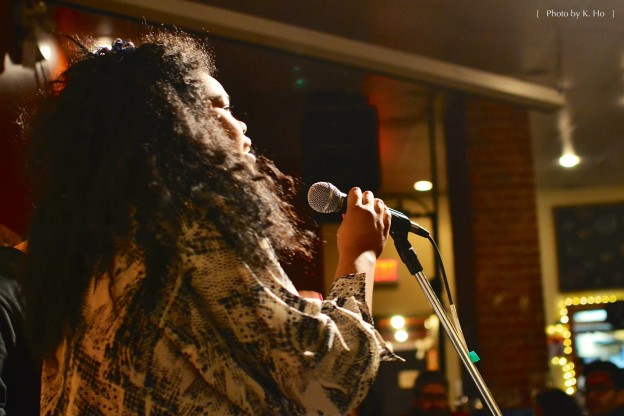“There is no greater agony than bearing an untold story inside you.”
At an open mic evening called Spoken Works III: Centring Black Voices, some of those stories were released. Held on March 4th at Heartwood Community Café, non-black organizer Jane Shi explained that the vision for this event was multifaceted: to form an inclusive and anti-oppressive space; to honour the process of sharing through spoken word, poetry, and music; and to extend February as Black History Month and centre black voices. She clarified: “competitive poetry can often be intimidating, and dominated by an inaccessible aesthetic. Centring voices amplifies voices.” As a non-black person of colour as well, I strive to avoid any appropriation of voices and experiences that are not my own. I do hope, however, to situate the performances within a larger concept of art and expression as a form of revolution.
“Humans are capable of seeing themselves in the act of seeing, of thinking their emotions, of being moved by their thoughts.”
– Augustus Boal, Theatre of the Oppressed
Augustus Boal’s Theatre of the Oppressed sheds light on the possibility of social and political change, made concrete when spectators feel empowered to participate. Boal began this participatory theatre movement in late 1960s Latin America, in which he suggested that the theatre becomes the literal stage to act out the ways that marginalized people have been repressed and the forces that repress them, bringing it to the forefront of their consciousness. I find that any type of artistic expression has the same profound effect. As “spect-actors,” artists are capable of exploring and transforming the dramatic reality they live in as a ‘rehearsal for revolution.’ The importance of creating a space for people to share rough drafts, old works, and deepest reflections was highlighted at Spoken Works. In the words of artists and audience alike, crucial dialogue came into the spotlight that would otherwise be difficult to engage with in public.
One of the poets, Wendy-Akosua Addo, gave context for her semi auto-ethnographic piece ‘Voices on my African Canadian Ears’: “Everyone has stories, and they should be able to share them more. It’s really empowering, you realise connections you didn’t know existed.” Performer Anoushka Ratnarajah’s reflection on “amalgamations of racism” while growing up mixed-race in the English town of Ladner was born because “these stories are usually pushed to the side. But in an audience of peers, it has the opportunity to be healing. You get to process trauma, good feelings, and memories because anybody is welcome, everyone is warm and supportive, and you absorb that energy. There’s not a lot of that in traditional art.” These are just a few examples of poetry that started out in catharsis that turned into unifying symbols of specific experience. Words are powerfully inspiring tools, once you absorb the rich imagery. Because art transgresses.
“The personal is political.”
– Carol Hanisch, in a 1969 Essay of the same title
The element of theatre that’s built into art empowers people whose voices are marginalized in society. Artists subvert the overarching structures by reclaiming power through their creations, regardless of medium or skill level. As described by Aly Dee, a visual artist at Spoken Works: “Making art is medicine.” She emphasised the significance of any art made by racialized people, as “essential to survival” and crucial to their story. The resistance that comes with performance and participation can have meaningful implications even as a spectator. Urooba Jamal shared that her first introduction into social justice was through slam poetry, because “sharing a common space with radical people…is where the revolution starts.” Cicely Blain clarified: “Especially if your voice is not generally represented or heard, art is your outlet, and in a space [like Spoken Works], it is safe.” More importantly, she emphasised the personal impact that comes with disclosure as helpful to counter the self-censorship that marginalized persons live with constantly. In learning to be honest with yourself and unlearning internalised oppression, “the revolution can be as much as loving yourself.”
[Spoken Works III: Centring Black Voices – event page]




